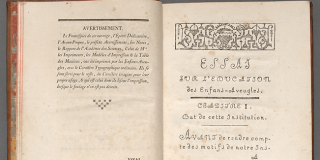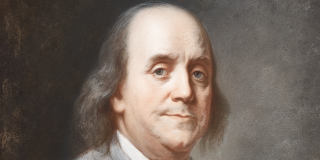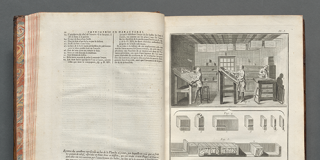
Denis Diderot (1713–1784), editor
Encyclopédie, ou dictionnaire raisonné des sciences, des arts, et des métiers, par une société de gens de lettres (Encyclopedia, or reasoned dictionary of sciences, arts, and craft by a society of a people of letters)
Paris: De l’imprimerie de Le Breton, imprimeur ordinaire du Roy, 1751–1765
George Arents Collection
Encyclopédie, ou dictionnaire raisonné des sciences, des arts, et des métiers, par une société de gens de lettres (Encyclopedia, or reasoned dictionary of sciences, arts, and craft by a society of a people of letters)
“Que sais-je?”—“What do I know?” asked the 16th-century essayist Michel de Montaigne as he tested the world with a compassionate but pressing skepticism. His intellectual descendant, the philosopher Denis Diderot, expanded this inquiry in his Encyclopédie, asking, “Que savons-nous?”—“What do we know?” What do we know about nature, culture, God, ethics, printing, architecture, medicine?
The answers—including contributions from Voltaire, Rousseau, and Montesquieu—eventually ran to 28 volumes, with all human understanding organized under the concepts of “Memory,” “Reasoning,” and “Imagination.” Created during France’s rigid, class-based ancién regime, this signal document of the Enlightenment was initially suppressed by the Crown for its subversive content. Three decades later, Diderot’s championing of reason, knowledge, and natural rights would help shape the intellectual underpinnings of the French Revolution.
Currently on View at Stephen A. Schwarzman Building
The New York Public Library believes that this item is in the public domain under the laws of the United States, but did not make a determination as to its copyright status under the copyright laws of other countries. This item may not be in the public domain under the laws of other countries. Though not required, if you want to credit us as the source, please use the following statement, "From The New York Public Library," and provide a link back to the item on our Digital Collections site. Doing so helps us track how our collection is used and helps justify freely releasing even more content in the future.






